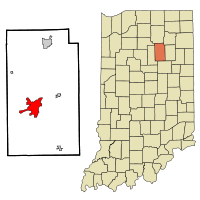Wabash, Indiana
| Wabash, Indiana | |
|---|---|
| City | |
| City of Wabash | |

Wabash from the air, looking west.
|
|
 Location in the state of Indiana |
|
| Coordinates: 40°48′3″N 85°49′38″W / 40.80083°N 85.82722°WCoordinates: 40°48′3″N 85°49′38″W / 40.80083°N 85.82722°W | |
| Country | United States |
| State | Indiana |
| County | Wabash |
| Township | Noble |
| Government | |
| • Mayor | Scott Long , 2016-Present |
| Area | |
| • Total | 9.13 sq mi (23.65 km2) |
| • Land | 8.89 sq mi (23.02 km2) |
| • Water | 0.24 sq mi (0.62 km2) 2.63% |
| Elevation | 712 ft (217 m) |
| Population (2010) | |
| • Total | 10,666 |
| • Estimate (2012) | 10,484 |
| • Density | 1,199.8/sq mi (463.2/km2) |
| Time zone | EST (UTC-5) |
| ZIP code | 46992 |
| Area code(s) | 260 |
| FIPS code | 18-79370 |
| GNIS feature ID | 445327 |
| Website | www.cityofwabash.com |
Wabash is a city in Noble Township, Wabash County, in the U.S. state of Indiana. The population was 10,666 at the 2010 census. The city is the county seat of Wabash County.
Wabash is notable as claiming to be the first electrically lighted city in the world, which was inaugurated on March 31, 1880. However, closer inspection of the reference show's only the court house grounds were lighted. It is also home to the historic Eagles Theater, Paradise Spring Treaty Grounds (1826), the Wabash and Erie Canal, Presbyterian Church (Wabash, Indiana) (1880), and Disciples of Christ Christian Church (Wabash, Indiana) (1865). A seasonal classic root-beer stand sits atop the man made geographic cut directly south of the Wabash river, and attracts locals to its traditional car-side service.
Wabash is located at 40°48′3″N 85°49′38″W / 40.80083°N 85.82722°W (40.800799, -85.827163).
According to the 2010 census, Wabash has a total area of 9.128 square miles (23.64 km2), of which 8.89 square miles (23.02 km2) (or 97.39%) is land and 0.238 square miles (0.62 km2) (or 2.61%) is water.
The name Wabash derives from a Miami-Illinois term for "water over white stones." The Wabash post office has been in operation since 1839. The Miami name reflected the clarity of the river in Huntington County, Indiana where the river bottom is limestone.
...
Wikipedia
